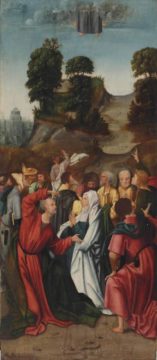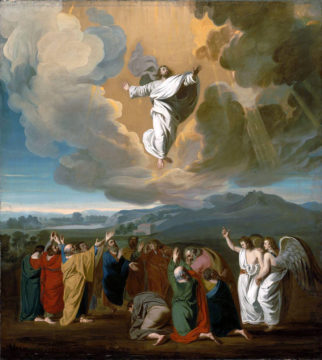Most dioceses in the United States celebrate the feast of the Ascension on the 7th Sunday of Easter. Therefore, the background and reflection questions here will focus on the gospel for that feast. Fr. Paul Gallagher, OFM offers a Scriptural Reflection. This content is edited by Franciscan Sister of Christian Charity Sister Anne Marie Lom and Joe Thiel. The excerpts from the Sunday readings are prepared by Joe Thiel. To read or download the complete pdf with excerpts for your prayer, please click here Franciscan Gospel Reflection May 2 2021. Excerpts are from the Lectionary for Mass for Use in the Dioceses of the United States of America, second typical edition © 2001, 1998, 1997, 1986, 1970 Confraternity of Christian Doctrine, Inc., Washington, DC. Used with permission. All rights reserved. No portion of this text may be reproduced by any means without permission in writing from the copyright owner. Images: Ascension of Jesus – Wikipedia
Mark 16:15-20
Jesus said to his disciples, “Go into the whole world and proclaim the gospel to every creature. Whoever believes and is baptized will be saved; whoever does not believe will be condemned. These signs will accompany those who believe: in my name they will drive out demons, they will speak new languages. They will pick up serpents with their hands, and if they drink any deadly thing, it will not harm them. They will lay hands on the sick, and they will recover.”
So then the Lord Jesus, after he spoke to them, was taken up into heaven and took his seat at the right hand of God. But they went forth and preached everywhere, while the Lord worked with them and confirmed the word through accompanying signs.
Background:
The early Christians understood the Lord’s ascension as part of Jesus’ resurrection, and not as a separate historical event in the life of Jesus. For example, in Luke’s gospel the events of that first day of the week include the three who go to anoint the body of Jesus discovering an empty tomb, Jesus’ revealing himself to the disciples on the road to Emmaus, his appearance and commissioning of the disciples in Jerusalem, and his ascension. In Luke all these things happen on the first day of the week:
On the first day of the week Mary Magdalene, Joanna, and Mary the Mother of James went to the tomb to anoint the body of Jesus. They found the tomb empty and were asked by two men in dazzling garments, “Why do you seek the living one among the dead?” They returned to the disciples and announced what had happened. Peter ran to the tomb and found only the burial cloth. That same day, two of them were on the road to Emmaus when Jesus himself began to walk with them, but they did not recognize him. The two were telling Jesus of the things that had happened in Jerusalem, and of the hope that they had had in Jesus. They also told Jesus that on that day some women were at the tomb and did not find the body of Jesus, but returned instead with an astonishing story that they were told in a vision that he was among the living. Then Jesus, still not recognized by the two, reinterpreted the events in light of the scriptures. That evening when they entered the town of Emmaus, the two invited Jesus to stay with them, and it was there when they broke bread together that they recognized him. They returned at once to Jerusalem and found the eleven and the disciples gathered. Those gathered told the two that the risen Jesus had appeared to Simon. While they were all still speaking Jesus appeared. He invited them to touch him and ate some fish to reassure them that they were not seeing a ghost. Then Jesus opened their minds to understand the scriptures, and commissioned them to be his witnesses, and promised to “send the promise of my Father upon you.” “Then he led them out as far as Bethany, raised his hands, and blessed them. As he blessed them he parted from them and was taken up to heaven. They did him homage and then returned to Jerusalem with great joy, and they were continually in the temple praising God.” (Summary of Luke 24, quoted 24:50-53)
Luke’s and John’s narratives of the ascension are different in how they separate the ascension from the resurrection. In Luke 24 the Ascension takes place on Easter evening or perhaps the next day. As Luke records the events of the resurrection, first the women and disciples discover the empty tomb, then Jesus appears to the two disciples on the road to Emmaus, then he appears to the disciples as the two who have returned form Emmaus are telling of their encounter. In the last verses of the gospel Luke states. “Then He led them out as far as Bethany, raised his hands, and blessed them. As he blessed them he parted from them and was taken up to heaven. They did him homage and then returned to Jerusalem with great joy. And they were continually in the temple praising God.” (Luke 24:50-53) It is unclear here exactly when the ascension is taking place. That may because explaining the historical chronology is not Luke’s intention.
 In John’s gospel the events of the resurrection and the ascension are very different. The 20th chapter of John’s gospel begins with Mary of Magdala’s discovery of the empty tomb and her report to Peter and the beloved disciple of her discovery. They in turn also find the tomb empty. Then John records a second time Mary Magdalene is at the tomb. That leads to her encounter with Jesus whom she mistakes as the gardener until he calls her by name. A second time she reports her experience to the disciples. Next John records Jesus’ appearance to the disciples. John states that appearance took place on the first day of the week, the day of the resurrection. Then John records Jesus’ second appearance to the disciples, and this time Thomas is with them. In 20:26 Johns states, “Now a week later his disciples were again inside and Thomas was with them.” This is the only suggestion in John’s gospel of the possibility of the ascension having followed some time later than the resurrection. But that is complicated by the fact that John’s gospel did not record the ascension at all. After Jesus’ encounter with the disciples with Thomas present, the gospel concludes. “Now Jesus did many other sings in the presence of His disciples that are not written in this book. But these are written that you may come to believe that Jesus is the Messiah, the Son of God, and that through this belief you may have life in his name.” (John 20:30-31)
In John’s gospel the events of the resurrection and the ascension are very different. The 20th chapter of John’s gospel begins with Mary of Magdala’s discovery of the empty tomb and her report to Peter and the beloved disciple of her discovery. They in turn also find the tomb empty. Then John records a second time Mary Magdalene is at the tomb. That leads to her encounter with Jesus whom she mistakes as the gardener until he calls her by name. A second time she reports her experience to the disciples. Next John records Jesus’ appearance to the disciples. John states that appearance took place on the first day of the week, the day of the resurrection. Then John records Jesus’ second appearance to the disciples, and this time Thomas is with them. In 20:26 Johns states, “Now a week later his disciples were again inside and Thomas was with them.” This is the only suggestion in John’s gospel of the possibility of the ascension having followed some time later than the resurrection. But that is complicated by the fact that John’s gospel did not record the ascension at all. After Jesus’ encounter with the disciples with Thomas present, the gospel concludes. “Now Jesus did many other sings in the presence of His disciples that are not written in this book. But these are written that you may come to believe that Jesus is the Messiah, the Son of God, and that through this belief you may have life in his name.” (John 20:30-31)
What emerges is the Gospel report of Jesus’ resurrection and the assertion of this disciple coming to believe in that reality, and the fact that they record these events shows their desire for others to know and believe in the resurrection of Jesus. But to think of the Ascension of Jesus separate from the Resurrection is beyond what early Christians were trying to pass on to us. Still there is much to be gained by taking the time reflect on the Ascension as one aspect of the Death, Resurrection and Ascension of Jesus.
Reflection Questions:
- We all experience departures as a part of our life. What are some departures that have been significant for you?
- When have you initiated the departure, and when has it been thrust upon you?
- Considering some of departures that came to mind more deeply, how were you shaped or changed by those events?
- Has there ever been a time when you felt like God has abandoned you?
- Looking into the scriptures, how were the disciples changed by the Ascension?
- In the opening line of this gospel text, Jesus asked the disciples to go into the whole world and preach the gospel to every creature. When you hear these words today, what do you hear God saying to you?
- Can you take some time now to personally talk with God about whatever it is that arises within you as you reflect with this gospel text?



